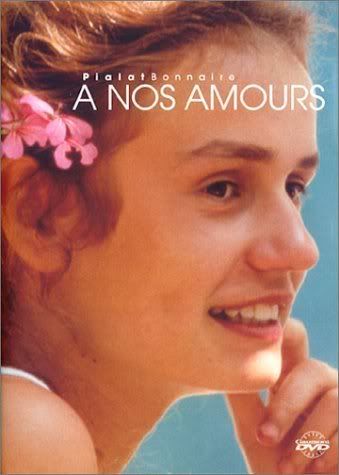A Nos Amours (Maurice Pialat, 1983)
 A Nos Amours greatly reminded me of another French filmmaker who is interested in adolescent sexuality and the maturity that goes with it, Catherine Breillat. Unlike Breillat, however, Pialat infuses his films with gentle reality, instead of the graphic sexuality and philosophy that Breillat does. Don't get me wrong, I love a lot of Breillat's films, but A Nos Amours touched me in a way that Breillat's films never have (or have never even meant to, really). It is the story of Suzanne, played truly remarkably by Sandrine Bonnaire, who, at 15, sees her parents separate in a painful way, and becomes promiscuous in order to make up for the love she doesn't receive at home. Eventually, she does get married, but, as her father tells her, she's just like him in that she will never be able to truly love anyone. She loves to be loved, but cannot reciprocate the feeling. Pialat makes this message crystal-clear, and, in the story, it is obvious how strong the relationship between family life and sexual activity is. At the beginning of the film, Suzanne has a steady boyfriend, Luc, who loves her very much, but she decides to give up her virginity in a field to an insensitive American soldier. This experience is so traumatizing to her that she tells the soldier (in French, so her probably did not understand), that it was free, he did not have to pay her. The scene is painful, but one senses that Suzanne did it simply because it was painful, and she wanted to ruin her relationship with Luc. After she breaks up with Luc, she goes to man after (older) man, and is obviously looking for a father figure. She even tells one of her lovers that when she meets a new guy, she wonders if her father would like him. Not only is Suzanne's sexual life sort of self-destructive, her homelife is even more terrible: she is alternatingly beaten and (subtly, very subtly) lusted after by her older brother, and screamed at by her mother. It's no wonder she leaves the house and stays with men all the time; I would, too. One of my favorite questions posed by this film is that of maturity: Bonnaire, at 16, plays Suzanne from ages 15 to (about) 18, without herself aging at all. It's striking to see baby-faced Bonnaire as a married Suzanne, but it makes you think about what makes a woman; it's obvious that Suzanne has had many "adult" relations, and is married, so what makes her a woman? Is it experience? Is it just the arbitrary number of age? And although I have described the link between family and sexual behavior as obvious, it does everything but beat you over the head, and instead makes you think about the politics of sexuality, and even Freudianism. Pialat himself plays Suzanne's father, with whom she has a very close, yet very distant, relationship. Suzanne spends the whole film looking for a man to love her, be it her father, her numerous lovers, or her eventual husband. If she does, or ever will, find that love is a question that will stay with you long after watching this exceptional film. 9/10 RIYL: Catherine Breillat (this film is a different exploration of the themes in 36 Fillette) Labels: 1983, maurice pialat |

Comments on "A Nos Amours (Maurice Pialat, 1983)"
post a comment